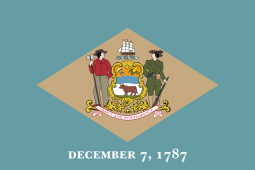|
Flag of Delaware
The flag of Delaware consists of a buff-colored diamond on a field of colonial blue, with the coat of arms of the state of Delaware inside the diamond. Below the diamond, the date December 7, 1787, declares the day on which Delaware became the first state to ratify the United States Constitution. The colors of the flag reflect the colors of the uniform of General George Washington. The coat of arms in the center of the flag was adopted on January 17, 1777. It depicts a shield of horizontal orange, blue, and white stripes. On the stripes are a sheaf of wheat, an ear of corn, and an ox standing on grass, all representing Delaware's agriculture. Above the shield is a sailing ship. Supporting the shield are a farmer on the left and a soldier on the right. The state motto, below the shield, reads "Liberty and Independence". These symbols are also included on the seal of Delaware. The current flag was adopted on July 24, 1913.[1] During the American Civil War, regiments from Delaware flew a flag which was similar to the state coat of arms on a field of blue. In 2001, a survey conducted by the North American Vexillological Association (NAVA) placed Delaware's flag 52nd in design quality out of the 72 Canadian provincial, U.S. state and U.S. territorial flags ranked.[2] Laws that enact the flagThe design of the official state flag shall be as follows: A background of colonial blue surrounding a diamond of buff in which diamond is placed the correct coat of arms of the state in the colors prescribed by law and in accordance with §301 of this title, with the date, "December 7, 1787", to be inscribed underneath the
Governor's flagThe official flag of the governor of the state shall be identical to the official flag of this state except that it shall also bear a fringe of gold, surrounding the edge of the flag and the pole upon which the governor's flag is carried shall have mounted thereon a model of a blue hen's fighting cock. See alsoReferences
Further reading
External links |
||||||||||||
